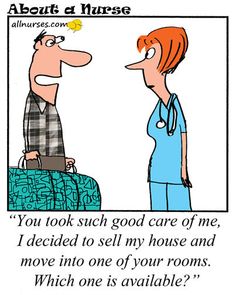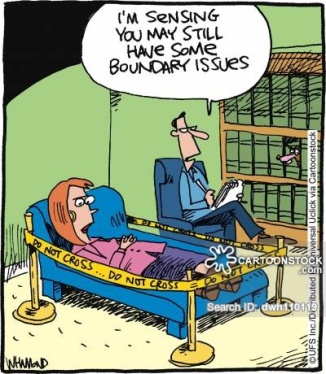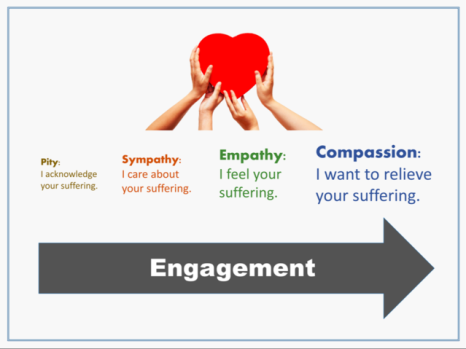“Empathy minus boundaries is not empathy” – Dr Brene Brown
I am a proponent of ‘tough love’ (or rather, honesty) but it has taken me ages to learn how to say no… and I know I’m not alone in this. Saying no to a person/task/idea that we don’t like is easy; saying to no to something or someone that we deeply care about is much, much harder. But surely we should say yes to those who we care about, in order help them? Time to do a cost-benefit analysis!
Well, that’s what I should have done before I burnt out at age 23 by working myself to the bone in Marketing. Saying yes to every demand my micro-managing boss placed on me got me nowhere – but I loved my job, it was my identity. Would saying no to it be saying no to, well… me?
To ease my frustrations, I used my most practiced coping mechanism of exercise. Not alcohol, not drugs, not binge-eating but exercise… that’s pretty healthy, right? Wrong. Too much of anything isn’t great. Too much high-intensity exercise caused my already-piqued endocrine system to produce more endorphins, cortisol and adrenalin to pick me up out of those deep valleys filled with negativity… and without adequate rest periods, cortisol levels won’t fall back to normal so, in a self-induced state of elevated stress, I pursued more and more high intensity exercise to release more feel-good endorphins. This doesn’t actually work FYI. It means you end up killing someone (ONLY JOKING).
Now older and somewhat wiser, I use an emotional cost-benefit analysis pretty frequently: “If I do this activity, how does it impact my ability to fulfil my other priorities?” Priorities might be tangible – for example, cleaning the house on Sunday before the week begins. The ability to fulfil these priorities depends on behaviour – behaviour is our values in action.
For example, integrity is a value (integrity: the quality of being honest and having strong moral principles). A behaviour of integrity would be to do what you say you will, or to take responsibility for your actions. A concrete example would be to mop the floor as you’d promised your partner you would. Values in action.
Ok so back to the emotional cost-benefit analysis; “If I go to the BBQ this afternoon, how does it impact on my ability to mop the floors?” Will the floors get mopped or not? If the answer is no, is that behaviour in line with my value of integrity? How does being untrue to my values that make me feel? How does it make the person I’ve promised the clean floor to feel? Don’t know about you, but it makes me feel preeeeeetty shit to be living life inauthentically (that was my 2012, a GREAT year). Bingo, that’s the emotional part. Suffering.
The emotional cost-benefit analysis is a tool to help clarify our boundaries. Because, let’s be honest, who can say they’ve always been good at saying no AND not been a complete prick the whole time? Not many people. Boundaries take practice, years of practice.
Children need boundaries; adults or parents usually make boundaries (rules) for them. Whether it be don’t feed your dinner to the dog (at home), or don’t touch other students whilst sitting on the mat (at school), rules assist children in navigating their way into the adult world. Like anything, too many or too few boundaries can be detrimental but overall the literature supports children having boundaries. As a non-parent, I’d like to be able to show my future children how to make boundaries, as this is a skill often missed in some authoritarian households (note that authoritarian is very different to authoritative). In my tenure as a primary school teacher, I’d collaboratively make a list of ‘classroom rules’ with input from the kids – the discussion about what was ok and what wasn’t ok was often very enlightening.
What happens when a child pushes up against a boundary set by their parents or teacher? Confrontation, upset, discomfort. A two year old who has just been told they can’t play with their toys whilst eating breakfast is going to show their dissatisfaction about this quite clearly. Cue a tantrum. Tantrums aren’t pleasant for anyone, least of all the new mum who’s running on four hours sleep and is six months pregnant.
Kids need boundaries and they usually have no qualms in finding out where those boundaries lie – often this isn’t the case if the punishment for crossing a previous boundary has been too severe. A child isn’t going to continue to push his or her boundaries – and pushing boundaries is a normal part of growing up – if they cop a giant walloping every time they cross one. Punishment could be biting your grandchild back when he bites his sister (a tough way of developing empathy in a two year old perhaps, I can’t say what my grandmother was thinking). A more severe example may be the physical abuse of a child by their drug-addicted parent. Once bitten, twice shy. Trauma can be accumulated over generations.

Asserting our boundaries isn’t comfortable. Saying, “No, sorry I can’t help today,” brings temporary discomfort. We’re social creatures, we instinctively want to help others and seemingly denying others our help doesn’t immediately feel good. But choosing discomfort over resentment is a long-term choice. Speaking up to feel that (temporary) discomfort beats years of resentment and unspoken judgement, because at some point all those repressed feelings end up exploding out. Emotions are sometimes just like farts, better out than in.
Those whose job is to help people – teachers, social workers, nurses, doctors even fitness instructors – will likely experience compassion fatigue during their working lives.
 This extends to anyone who helps out others, especially family members, relatives, and other informal caregivers of patients suffering from a chronic illness.
This extends to anyone who helps out others, especially family members, relatives, and other informal caregivers of patients suffering from a chronic illness.
I will never forget the healthy lifestyle workshop I was running for teenage parents a few years ago. There was a social worker in the room who had been assigned to help ease the session, given there were some girls exhibiting particularly challenging behaviours. Out of all of the workshop participants the social workers’ behaviour was the most challenging; she took a keen interest in the workshop material (a good thing!), applying the concepts to her own family and asking so many questions that it required more facilitation skills than I had to turn the discussion back to the topic and make it an inclusive activity. All the while, the supposed purpose of her presence was to support the teenage mums in the group and assist them in their learning.
Compassion fatigue occurs when individuals focus intently on helping everyone else to the detriment of their own wellbeing. The lack of self care results in their (intentionally selfless) actions becoming quite unconsciously selfish. Compassion fatigue happens when we don’t maintain our boundaries. To use another cliche, you can’t fill from an empty well – un-boundaried compassion comes at the expense of empathy and its precursors.
Coming back to the ECBA (that’s the emotional cost benefit analysis), what’s this PWC-like tool got to do with compassion?
Generosity cannot exist without boundaries. An emotional cost benefit analysis helps us understand and determine our boundaries. You don’t donate your entire income to charity because it wouldn’t leave you enough to make ends meet. Emotional energy is the same.
The most compassionate people that I’ve ever interviewed… happened to be the most boundaried. They happened to be the people who had very, very clear boundaries about what they were willing to do, what they were not willing to do, what they were willing to take on, and what they were not willing to take on.
One of the ways that shifted for me to be more compassionate is, I kind of struggle with feeling perpetually disappointed in people a lot. Like, why aren’t they living up to their expectations, why aren’t they living up to my expectations, why are they making these self-destructive choices? I can think of people in my life, where it’s like, oh my god it’s making me crazy!
One of the things that shifted for me, was this idea that maybe everyone – myself included – maybe everyone’s doing the best they can. But sometimes, that means that I don’t have to engage.
Dr Brene Brown, Daring Greatly
Of course, it’s also possible to be too boundaried too. Learning to negotiate those boundaries with another person (aka ‘how to relationship’) is a whole different journey.
And maybe it’s another blog post, in due course. Until next time…


